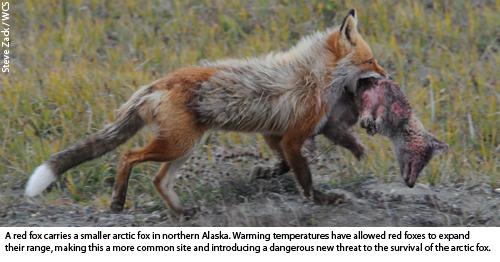Climate Adaptation Fund
Climate Adaptation Fund
The Wildlife Conservation Society’s North America Program is pleased to announce the first round of grantmaking through the WCS Climate Adaptation Fund – a program to support projects that demonstrate effective interventions for wildlife adaptation to climate change.
With funding provided by the Doris Duke Charitable Foundation and managed by the Wildlife Conservation Society (WCS), the WCS Climate Adaptation Fund will provide up to $2 million in competitive grants in 2011. Grants will be 1-2 years in length.
Awards will be made to nonprofit conservation organizations for applied, on-the-ground projects focused on implementing priority conservation actions for climate adaptation at a landscape scale.
Interested organizations should carefully review the guidelines outlined in the Request for Proposals (RFP), found below, and submit the required pre-proposal application no later than 5:00 PM MST on Friday, April 29, 2011.
2011 WCS Climate Adaption Fund Request For Proposals (.pdf file, 183 KB)
WCS Climate Adaptation Fund Pre-Proposal Application Form (.doc file, 69 KB)
Grants awarded through the Climate Adaptation Fund will support wildlife adaptation projects that are designed to implement landscape-scale strategic habitat conservation plans and achieve the following types of results:
- Demonstrate land management techniques to assist wildlife adaptation to climate change;
- Protect or expand core habitat areas;
- Create new protected areas or change land use designations to secure intact habitat;
- Assure connectivity for wildlife between core habitat areas; and
- Protect keystone species at risk from the impacts of climate change.
WHY THE CLIMATE ADAPTATION FUND?

Due to changing climate, high-elevation whitebark pines have become hospitable to outbreaks of mountain pine beetles, destroying entire stands of these trees critical to many species. Grizzly bears depend on these pine nuts to help them gain weight for winter and a decline of the whitebark pine means less nutrition during the critical months before hibernation begins. A warming climate is also contributing to the decline of western trout populations. Grizzlies may soon find another favorite—spawning cutthroat trout—off the menu. These impacts are being felt by humans, as well. Recreational anglers spent more than $3 billion in the eight Rocky Mountain states in 2006. A reduction in cutthroat and other cold water fish species could translate into a major economic loss for tourism, the fishing industry, state wildlife agencies, and the local communities that depend on these revenues.
This rise in temperature of just a few degrees has broad implications for wildlife. Without action to preserve functional ecosystems and assist wildlife in adapting to varying habitat conditions, climate change could prove devastating. Through the WCS Climate Adaptation Fund, we hope to help overcome the odds.

